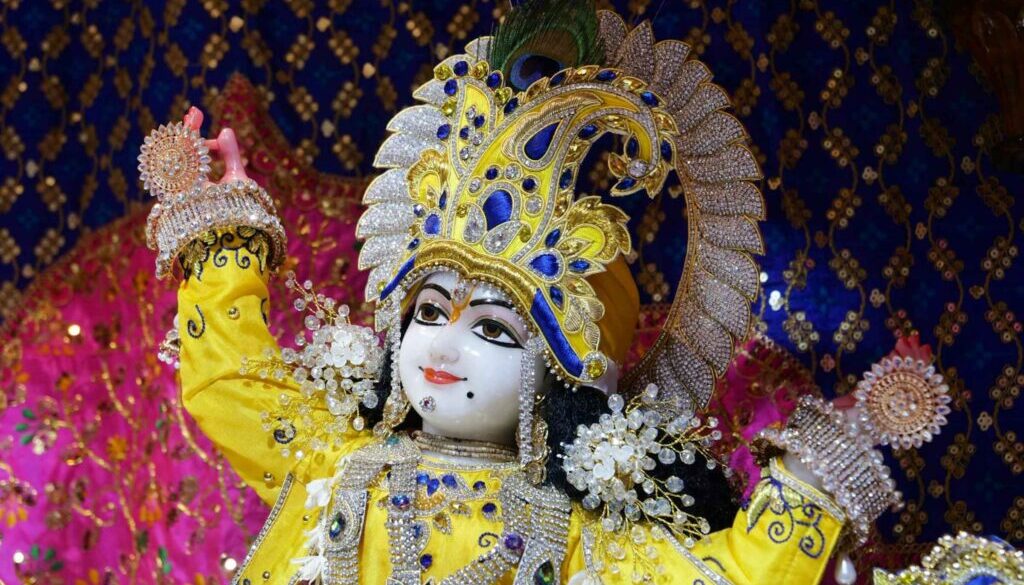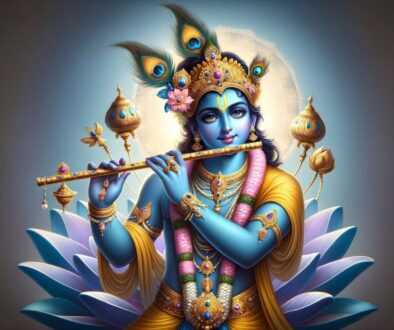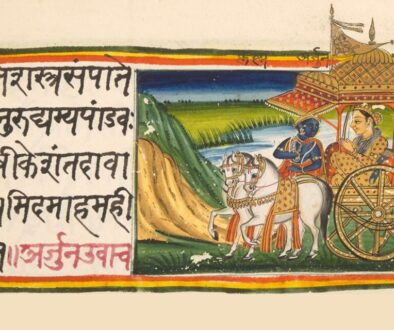What is Dharma According to Shri Krishna?
Defining Dharma: Beyond Righteousness
Dharma is one of the most complex and nuanced concepts in Hinduism. While it is often equated with righteousness or duty, Krishna’s teachings in the Bhagavad Gita reveal a deeper meaning. Dharma is not just about following a set of rules or laws; it is the intrinsic nature of every being, the very essence that dictates one’s purpose and responsibilities in life. Krishna teaches that Dharma is the foundation upon which the universe operates, ensuring the balance and harmony of all creation.
In the Bhagavad Gita, Krishna explains that Dharma is not a one-size-fits-all concept. Each individual has their unique Dharma based on their role, position, and circumstances in life. This personalized approach to Dharma underscores its significance as a guiding principle in one’s spiritual journey.
The Essence of Dharma: Understanding Krishna’s Concept of Righteousness
In the realm of Hindu philosophy, few concepts hold as much weight as Dharma, a term often translated as righteousness or duty. The teachings of Lord Krishna, particularly as articulated in the Bhagavad Gita, offer profound insights into the true nature of Dharma. Krishna’s discourse on Dharma transcends mere moral codes or societal norms; it delves into the very essence of human existence, guiding individuals toward a life of purpose and harmony. In this blog post, we will explore the essence of Dharma as explained by Krishna, its significance in our daily lives, and how these ancient teachings can be applied to modern times.
The Role of Dharma in the Cosmic Order
Krishna’s teachings emphasize that Dharma is integral to maintaining the cosmic order, known as Rta in Vedic philosophy. The universe, according to Hindu thought, functions in a state of balance and harmony, where every being has a specific role to play. Dharma ensures that this balance is preserved by guiding individuals to fulfill their duties and responsibilities according to their nature.
Krishna explains that when individuals perform their Dharma, they contribute to the greater good of the universe. Conversely, when one strays from their Dharma, it disrupts the cosmic order, leading to disharmony and suffering. This understanding of Dharma as a universal principle highlights its importance not only in personal life but also in maintaining the well-being of the entire cosmos.
Dharma and Karma: The Interplay
Dharma and Karma are two interconnected concepts that Krishna frequently discusses in the Bhagavad Gita. While Dharma refers to one’s duty or responsibility, Karma refers to the actions one performs. Krishna teaches that performing one’s Dharma without attachment to the results is essential for spiritual growth. This principle is known as Nishkama Karma, or selfless action.
Krishna emphasizes that detachment from the outcomes of our actions allows us to perform our duties with a pure heart, free from the dualities of success and failure, pleasure and pain. This selfless approach to Dharma and Karma leads to inner peace and spiritual liberation, as one aligns with the divine will rather than personal desires.
Krishna’s Guidance on Upholding Dharma
Arjuna’s Dilemma: A Lesson in Dharma
One of the most powerful illustrations of Dharma in Krishna’s teachings is the dilemma faced by Arjuna on the battlefield of Kurukshetra. As the great warrior prepares to engage in battle against his own family, he is overcome with doubt and confusion. Arjuna’s internal conflict between his duty as a warrior and his love for his relatives highlights the complexity of Dharma.
Krishna’s guidance to Arjuna serves as a profound lesson in understanding and upholding Dharma. He advises Arjuna to rise above his personal emotions and focus on his duty as a Kshatriya (warrior), which is to fight for justice and protect righteousness. Krishna teaches that Dharma must be upheld even in the face of personal challenges, as it is the foundation of a just and harmonious society.
The Importance of Detachment in Performing Dharma
A central theme in Krishna’s teachings is the concept of detachment. He instructs Arjuna to perform his Dharma without attachment to the results. This detachment is not about indifference but about maintaining equanimity in the face of success or failure. By focusing on the act of fulfilling one’s duty rather than the outcome, one can perform their Dharma with a clear mind and a pure heart.
Krishna explains that attachment to the fruits of one’s actions can lead to ego, pride, and ultimately, suffering. By practicing detachment, individuals can transcend these worldly attachments and connect with their higher self, leading to spiritual growth and liberation.
Swa-Dharma vs. Para-Dharma: Knowing Your Duty
Krishna introduces the concept of Swa-Dharma (one’s own duty) versus Para-Dharma (the duty of another) in the Bhagavad Gita. He emphasizes the importance of understanding and performing one’s own Dharma rather than imitating someone else’s. Each individual has a unique role in the grand scheme of life, and fulfilling this role with sincerity and dedication is key to achieving spiritual fulfillment.
Krishna warns against the dangers of following another’s Dharma, as it can lead to confusion, dissatisfaction, and a loss of one’s true purpose. By embracing and performing one’s own Dharma, an individual can live a life of authenticity, integrity, and spiritual alignment.
Applying Krishna’s Teachings on Dharma in Modern Life
Dharma in Personal Life: Balancing Roles and Responsibilities
In the modern world, where individuals are often juggling multiple roles and responsibilities, Krishna’s teachings on Dharma are particularly relevant. Whether as a parent, a professional, or a member of the community, understanding one’s Dharma helps in balancing these roles effectively. Krishna’s guidance on Dharma encourages individuals to focus on their inherent duties, without being swayed by external pressures or societal expectations.
For example, a person may have the Dharma of a parent, which involves nurturing and guiding their children. Simultaneously, they may have a professional Dharma that requires them to perform their job with dedication and integrity. Krishna’s teachings remind us that by embracing these duties and performing them with devotion and detachment, we can lead a more balanced and harmonious life.
Professional Dharma: Ethics and Integrity in the Workplace
Krishna’s concept of Dharma can be applied to the professional sphere as well. Upholding ethics, integrity, and fairness in the workplace is a form of Dharma. Krishna teaches that it is not just the results of our work that matter, but the manner in which we conduct ourselves. By adhering to our professional Dharma, we contribute to a positive and ethical work environment.
In today’s competitive work culture, it is easy to lose sight of ethical principles in the pursuit of success. However, Krishna’s teachings remind us that true success is achieved not by compromising our values but by performing our duties with honesty and integrity. This approach not only brings personal satisfaction but also earns respect and trust in the professional world.
Social Dharma: Contributing to Society
Krishna’s teachings extend beyond personal and professional duties to encompass our responsibilities towards society. Social Dharma involves being a responsible citizen, contributing to the welfare of the community, and standing up for justice and righteousness. In the Bhagavad Gita, Krishna emphasizes the importance of social responsibilities, urging individuals to perform their duties towards society with dedication and selflessness.
In the modern context, this could mean participating in community service, supporting social causes, or simply being aware of the impact of our actions on others. By fulfilling our social Dharma, we contribute to the greater good and help build a just and equitable society.
The Spiritual Dimension of Dharma
Dharma and Spiritual Growth: Krishna’s Path to Liberation
Krishna’s teachings reveal that adhering to Dharma is not just about societal or personal obligations but also about spiritual growth. By performing our duties without attachment, we purify our minds and progress on the path to liberation (Moksha). Krishna highlights that Dharma, when practiced with the right intention, leads to spiritual enlightenment and unity with the divine.
The practice of Dharma is closely linked to the concept of Svadharma, or self-duty, which involves understanding and aligning with one’s true nature. Krishna teaches that by living according to our Svadharma, we fulfill our spiritual purpose and move closer to liberation. This spiritual dimension of Dharma underscores its significance as a means of transcending the material world and attaining union with the divine.
The Ultimate Dharma: Surrendering to Krishna
In the Bhagavad Gita, Krishna declares that the ultimate Dharma is complete surrender to the divine will. He assures that those who surrender to him with devotion and faith are freed from all sins and attain eternal peace. This surrender, according to Krishna, is the highest form of Dharma and the ultimate goal of human life.
Krishna’s teachings emphasize that surrendering to the divine is not a passive act but an active expression of faith and devotion. By placing our trust in Krishna and following his guidance, we align ourselves with the cosmic order and fulfill our highest potential. This act of surrender is the culmination of the spiritual journey, leading to liberation and eternal bliss.
Conclusion: The Timeless Relevance of Krishna’s Teachings on Dharma
Embracing Dharma in Everyday Life
Krishna’s teachings on Dharma offer profound insights into how we can lead a balanced, ethical, and spiritually fulfilling life. In a world where moral dilemmas and challenges are ever-present, the essence of Dharma as explained by Krishna provides a guiding light. By understanding and practicing our Dharma, we not only contribute to the cosmic order but also find inner peace and purpose.
Krishna’s teachings remind us that Dharma is not a rigid set of rules but a dynamic and evolving principle that adapts to the circumstances of life. Whether in personal, professional, or social spheres, Dharma serves as a compass that guides us toward righteousness and harmony. By embracing Dharma in our everyday lives, we can navigate the complexities of life with wisdom, grace, and spiritual integrity.
Krishna Teachings and Dharma
As we reflect on Krishna’s teachings, it is clear that Dharma is more than just a set of rules—it is the foundation of a righteous and harmonious life. Whether in personal, professional, or spiritual realms, adhering to our Dharma helps us navigate the complexities of life with wisdom and grace. The timeless relevance of Krishna’s teachings continues to inspire and guide us on our journey toward truth and self-realization.




